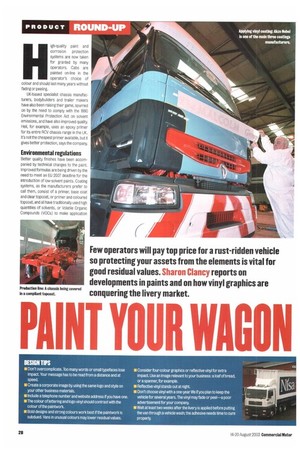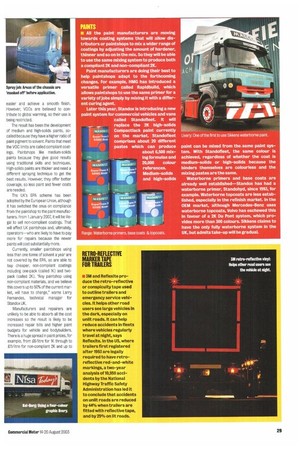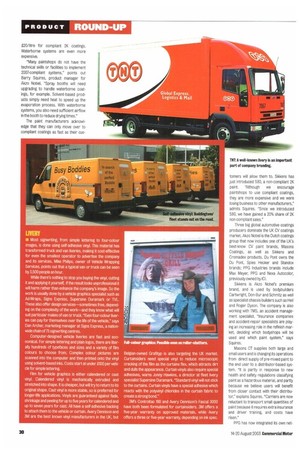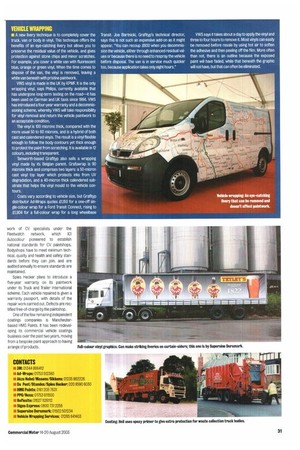H igh-quality paint and
Page 28

Page 29

Page 30

Page 31

If you've noticed an error in this article please click here to report it so we can fix it.
corrosion protection systems are now taken for granted by many operators. Cabs are painted on-line in the operator's choice of colour and should last many years without fading or peeling.
UK-based specialist chassis manufacturers, bodybuilders and trailer makers have also been raising their game, spurred on by the need to comply with the 1990 Environmental Protection Act on solvent emissions, and have also improved quality. Heil, for example, uses an epoxy primer for its entire RCV chassis range in the UK. It's not the cheapest primer available, but it gives better protection, says the company.
Environmental regulations
Better quality finishes have been accompanied by technical changes to the paint. Improved formulas are being driven by the need to meet an EU 2007 deadline for the introduction of low-solvent paints. Coating systems, as the manufacturers prefer to call them, consist of a primer, base coat and clear topcoat, or primer and coloured topcoat, and all have traditionally used high quantities of solvents, or Volatile Organic Compounds (VOCs) to make application easier and achieve a smooth finish. However, VC)Os are believed to contribute to global warming, so their use is being restricted.
The result has been the development of medium and high-solids paints, socalled because they have a higher ratio of paint pigment to solvent. Paints that meet the VOC limits are called compliant coatings. Paintshops like medium-solids paints because they give good results using traditional skills and techniques. High-solids paints are thicker and need a different spraying technique to get the best results. However, they offer better coverage, so less paint and fewer coats are needed.
The UK's EPA scheme has been adopted by the European Union, although it has switched the onus on compliance from the paintshop to the paint manufacturers, From 1January 2007, it will be illegal to sell non-compliant coatings. That will affect UK paintshops and, ultimately, operators—who are likely to have to pay more for repairs because the newer paints will cost substantially more.
Currently, smaller paintshops using less than one tonne of solvent a year are not covered by the EPA, so are able to buy cheaper, non-compliant coatings including one-pack (called 1K) and twopack (called 2K). "Any paintshop using non-compliant materials, and we believe this covers up to 50% of the current market, will have to change," warns Larry Fernandes, technical manager for Standox UK.
Manufacturers and repairers are unlikely to be able to absorb all the cost increases so the result is likely to be increased repair bills and higher paint budgets for vehicle and bodybuilders. There is a huge spread in paint prices, for example, from 26/litre for 1K through to 211/litre for non-compliant 2K and up to .£20/litre for compliant 2K coatings. Waterborne systems are even more expensive.
"Many paintshops do not have the technical skills or facilities to implement 2007-compliant systems," points out Barry Squires, product manager for Akzo Nobel. "Spray booths will need upgrading to handle waterborne coatings, for example. Solvent-based products simply need heat to speed up the evaporation process. With waterborne systems, you also need sufficient airflow in the booth to reduce drying times."
The paint manufacturers acknowledge that they can only move over to compliant coatings as fast as their cus tomers will allow them to. Sikkens has just introduced S80, a non-compliant 2K paint. "Although we encourage paintshops to use compliant coatings, they are more expensive and we were losing business to other manufacturers," admits Squires. "Since we introduced SBO, we have gained a 20% share of 2K non-compliant sales."
Three big global automotive coatings producers dominate the UK CV coatings market. Akzo Nobel is the Dutch coatings group that now includes one of the UK's best-know CV paint brands, Masons Coatings, as well as Sikkens and Cromadex products. Du Pont owns the Du Pont, Spies Hecker and Standox brands; PPG Industries brands include Max Meyer, PPG and Nexa Autocolor, previously owned by ICI.
Sikkens is Akzo Nobel's premium brand, and is used by bodybuilders Cartwright, Don-Bur and Schmitz as well as specialist chassis builders such as Heil and Roger Dyson. The company is also working with TMS, an accident management specialist. "Insurance companies and accident-repair specialists are playing an increasing role in the refinish market, deciding which bodyshops will be used and which paint system," says Squires.
Masons CT supplies both large and small users and is changing its operations from direct supply of pre-mixed paint to the end user to a distributor-based system. "It is partly in response to new health and safety regulations classifying paint as a hazardous material, and partly because we believe users will benefit from closer contact with their distributor," explains Squires. "Carriers are now reluctant to transport small quantities of paint because it requires extra insurance and driver training, and costs have risen."
work of CV specialists under the Reetwatch network, which ICI Autocolour pioneered to establish national standards for CV paintshops. Bodyshops have to meet minimum technical, quality and health and safety standards before they can join, and are audited annually to ensure standards are maintained.
Spies Hecker plans to introduce a five-year warranty on its paintwork under its Truck and Trailer International scheme. Each vehicle repaired is given a warranty passport, with details of the repair work carried out. Defects are rectified free-of-charge by the paintshop.
One of the few remaining independent coatings companies is Manchesterbased HMG Paints. It has been redeveloping its commercial vehicle coatings business over the past two years, moving from a bespoke paint approach to having a range of products.
































































































































































